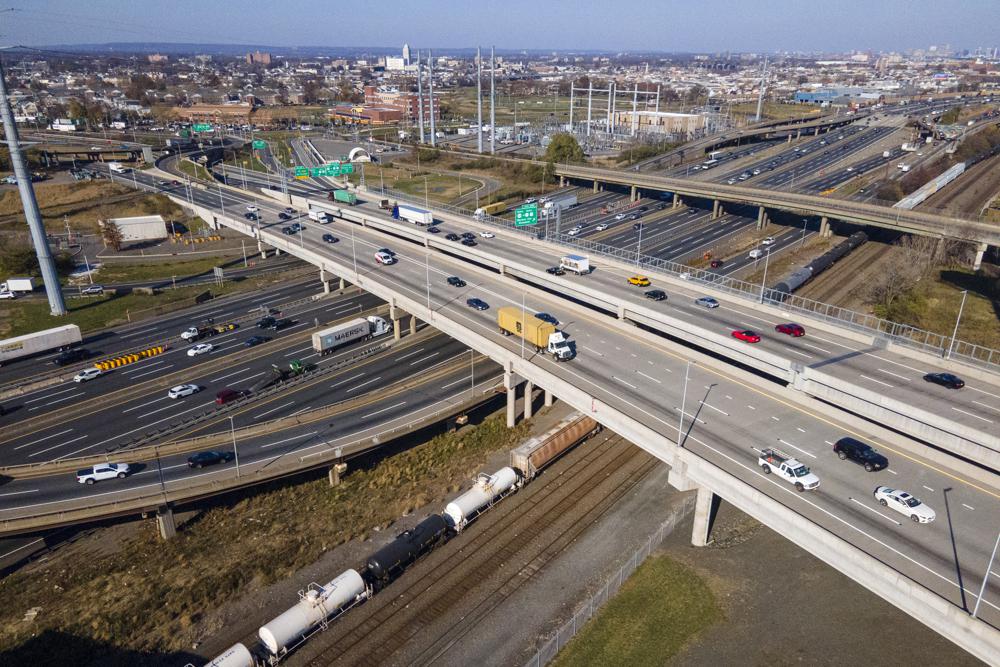The Thanksgiving travel rush was back on this year, as people caught planes in numbers not seen in years, setting aside inflation concerns to reunite with loved ones and enjoy some normalcy after two holiday seasons marked by COVID-19 restrictions.
Changing habits around work and play, however, might spread out the crowds and reduce the usual amount of holiday travel stress. Experts say many people will start holiday trips early or return home later than normal because they will spend a few days working remotely — or at least tell the boss they’re working remotely.
The busiest travel days during Thanksgiving week are usually Tuesday, Wednesday and the Sunday after the holiday. This year, the Federal Aviation Administration expects Tuesday to be the busiest travel day with roughly 48,000 scheduled flights.
Chris Williams, of Raleigh, North Carolina, flew Tuesday morning with his wife and two kids to Atlanta, Georgia, to spend the holiday with extended family.
“Of course it’s a stressful and expensive time to fly,” said Williams, 44, who works in finance. “But after a couple years of not getting to spend Thanksgiving with our extended family, I’d say we’re feeling thankful that the world’s gotten to a safe enough place where we can be with loved ones again.”
Although Williams said the family’s budget has been tight this year, he’s capitalized on the opportunity to teach his kids some personal finance basics. His youngest, 11, has been learning how to budget her allowance money since March and is excited to buy small gifts for her friends on Black Friday or Cyber Monday. “Probably slime,” she said, “with glitter.”
The Transportation Security Administration screened nearly 2.3 million travelers on Tuesday, down from more than 2.4 million screened the Tuesday before Thanksgiving in 2019. On Monday, the numbers were up versus 2019 — more than 2.6 million travelers compared with 2.5 million. That same trend occurred Sunday, marking the first year that the number of people catching planes on Thanksgiving week surpassed pre-pandemic levels.
“People are traveling on different days. Not everyone is traveling on that Wednesday night,” says Sharon Pinkerton, senior vice president at the trade group Airlines for America. “People are spreading their travel out throughout the week, which I also think will help ensure smoother operations.”
AAA predicts that 54.6 million people will travel at least 50 miles from home in the U.S. this week, a 1.5% bump over Thanksgiving last year and only 2% less than in 2019. The auto club and insurance seller says nearly 49 million of those will travel by car, and 4.5 million will fly between Wednesday and Sunday.
U.S. airlines struggled to keep up as the number of passengers surged this year.
“We did have a challenging summer,” said Pinkerton, whose group speaks for members including American, United and Delta. She said that airlines have pared their schedules and hired thousands of workers — they now have more pilots than before the pandemic. “As a result, we’re confident that the week is going to go well.”
U.S. airlines plan to operate 13% fewer flights this week than during Thanksgiving week in 2019. However, by using larger planes on average, the number of seats will drop only 2%, according to data from travel-researcher Cirium.
Airlines continue to blame flight disruptions on shortages of air traffic controllers, especially in Florida, a major holiday destination.
Controllers, who work for the Federal Aviation Administration, “get tested around the holidays. That seems to be when we have challenges,” Frontier Airlines CEO Barry Biffle said a few days ago. “The FAA is adding another 10% to headcount, hopefully that’s enough.”
Transportation Secretary Pete Buttigieg has disputed such claims, saying that the vast majority of delays and cancellations are caused by the airlines themselves.
TSA expects airports to be busier than last year and probably about on par with 2019. The busiest day in TSA’s history came on the Sunday after Thanksgiving in 2019, when nearly 2.9 million people were screened at airport checkpoints.
Stephanie Escutia, traveling with four children, her husband and her mother, said it took the family four hours to get through checking and security at the Orlando airport early Tuesday. The family was returning to Kansas City in time for Thanksgiving after a birthday trip to Disney World.
“We were surprised at how full the park was,” said Escutia, 32. “We thought it might be down some but it was packed.”
She welcomed the sense of normalcy, and said her family would be gathering for Thanksgiving without worrying about keeping their distance this year. “Now we are back to normal and looking forward to a nice holiday,” she said.
People getting behind the wheel or boarding a plane don’t seem fazed by higher gasoline and airfare prices than last year or the widespread concern about inflation and the economy. That is already leading to predictions of strong travel over Christmas and New Year’s.
“This pent-up demand for travel is still a real thing. It doesn’t feel like it’s going away,” says Tom Hall, a vice president and longtime writer for Lonely Planet, the publisher of travel guides. “That’s keeping planes full, that’s keeping prices high.”
(AP)











